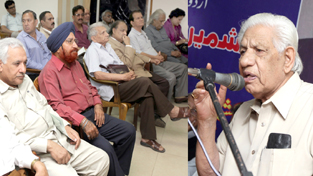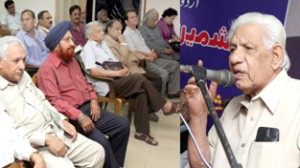
Excelsior Correspondent

JAMMU, Apr 16: “Until a writer contributes through meaningful creative expressions, he cannot truly absolve himself from the debt he owes to society. At the same time words have great power and it is writer’s duty to use them with responsibility, as weak works of literature, like weak children do not survive for long”.
Padamshree Kashmiri Lal Zakir, the nonagenarian legendary Urdu writer, a member of Jammu Central University Court, former chairman of Haryana Urdu Akademy, was sharing his views during an interaction which was organized by Jammu and Kashmir Academy of Art, Culture and Languages under its ‘Ek Mulaakat’ series, at the K L Saigal Hall, here today.
The grand old man of Urdu literature who through his 132 books that include well known novels like ‘Karmawali, ‘Aadhae Chaand Ki Raat’, ‘Mere Hisse Ka Kashmir’, anthologies of short stories, poems, essays and critical pieces, has not only fired the imagination of generations of readers but also contributed landmark creative literature to the language, speaking on the occasion, said that it was a like home coming for him as he is seeing Jammu after four decades.
Kashmiri Lal Zakir, born on April 7, 1919 and been a student of the SP School, Srinagar and Prince of Wales College, Jammu, recalling his association with Jammu and Kashmir, said that his love for the place is amply reflected through his stories and characters. He named several personalities of Jammu as his friends including Qudrat Ullah Shahab, Triloki Nath, Ved Bhasin and Arsh Sehbai. He became nostalgic while describing Jammu of the olden times.
The meet was presided over by noted writer and critic, Mohammed Yusuf Taing while noted journalist, Ved Bhasin, and former Vice Chancellor, Baba Ghulam Shah Badshah University, Rajouri, Dr Masoud Choudhary were in the presidium. Kamlesh Mohan, daughter of Kashmiri Lal Zakir, was also present.
Earlier, in his welcome address, Secretary Academy, Khalid Bashir Ahmad said that it was an honour for the Academy to host an eminent personality like Kashmiri Lal Zakir. He briefly dwelt upon the literary contribution of the eminent writer and recalled that as a student he was introduced to Zakir through the then popular magazine, ‘Bisween Sadi’.

